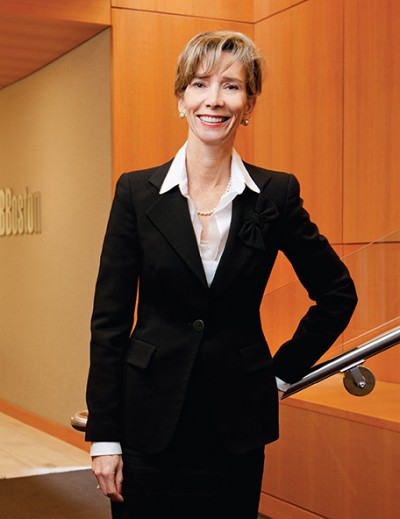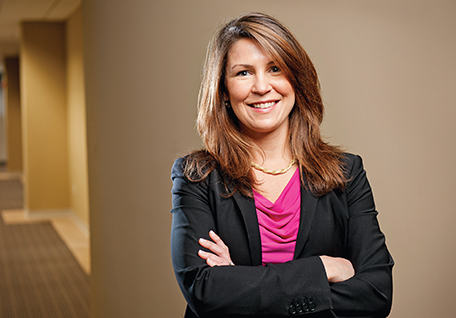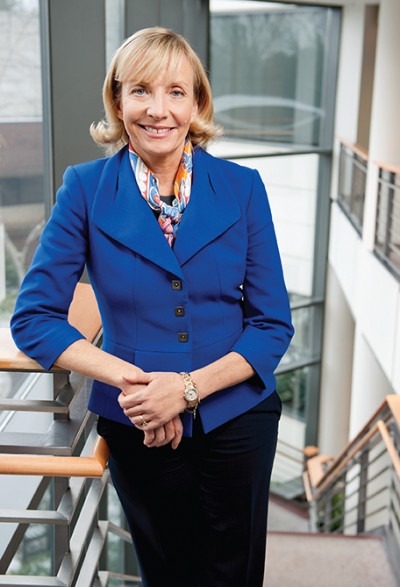
Susan Elliott, MBA’86
Executive Vice President and Chief Business Officer, Federal Home Loan Bank of Boston

Susan Elliott, MBA’86
Resilience and self-confidence—two characteristics Susan Elliott learned as a child who moved to new regions of the country twice during her school years. “I was born in Tennessee, and then going into fourth grade we moved to Buffalo, N.Y.,” says Elliott of the first move. “That was a big change culturally, and I had a wicked Southern accent.” The next move took her family to Cleveland just as she was starting high school. “I had to start all over twice with friends,” she says.
But the moves helped Elliott develop an independence that she has leaned on professionally and personally. “You develop a self-confidence that allows you to survive that when you’re a kid,” she says. She also credits a love of sports with helping hone her self-assurance and leadership skills. Along with organized sports such as softball and cross-country, Elliott was out playing kickball or whatever neighborhood games drew the kids together. “In business, you need to figure out how to be a team player,” she says.
Elliott has spent her entire career in banking, an industry not known for its female friendliness. She didn’t let its male dominance affect her, however. “Maybe I was naive, but I wasn’t really aware of any obstacles,” she says. “I didn’t see that there was any ceiling. I’m sure there must have been. But there was so much going on in banking at the time when I first started. All the different products that banks offered were changing. I was in retail banking, so it was kind of fun, and we were all learning at the same time.” Elliott focused on the opportunities. She learned about the new products and took advantage of openings to try different ventures.
In the early 1980s, a chance meeting made Elliott aware of an opening at the Federal Home Loan Bank (FHLB) of Boston, a wholesale bank for members in New England. At the time, she had just achieved a goal of landing a job at one of the premier banks in Boston and wasn’t looking to move. But while attending a banking conference, she met David Elliott (who years later would become her husband). He needed someone to run FHLB’s Housing and Community Investment program, which addresses affordable housing and local development. Impressed by her sales and business development background, he encouraged Elliott to apply. Intrigued, she researched the opportunity and decided to go for it. After convincing FHLB to hire her, she left the coveted big bank position. “They were appalled that I would be leaving such a big, fine institution to go work for such a small shop,” says Elliott, “but I liked being a bigger fish in a smaller pond.”
FHLB’s mission rang true with Elliott, who 32 years later, even with her expanded responsibilities, still manages the affordable housing side of the bank’s business. “I like that line of sight where you can see that you’re helping people,” she says. “There’s a part of me that’s always about helping people in some way.”
Along with her now-husband David Elliott, former FHLB president Ray Elliott (no relation) proved an early mentor. “He was a unique character and provided lots of opportunities for everyone here,” she says. “Very smart, very patient, and pushed you to be your best. He was a great influence on me along the way.”
Elliott’s leadership style is collaborative. She wants to hear ideas, and she encour-ages her employees to make them happen. “I’m not going to tell you how to do your job,” she says. “Do it yourself, but I’m there to provide guidance, and let’s talk about how things are going along the way.” Set goals, advises Elliott, and then meet to discuss obstacles and opportunities.
In her first managerial role as a branch manager, Elliott learned some important lessons from her employees. “They know a lot about what they’re doing in the business, how it works, and how it doesn’t,” she says. The job also taught her how to motivate people, who may come to an organization with their own needs and goals. “You have to understand them to be able to work with them effectively,” she says.
The banking industry is changing, says Elliott, who sees more women in leadership roles today than when she began. Having read Sheryl Sandberg’s book, Lean In, Elliott agrees that women must take advantage of opportunities, much like Elliott has done throughout her career. The younger generation of women already does this more naturally, she notes, saying her high school-aged daughter and friends don’t hesitate to go after what they want.
Nonetheless, women often are put in a position to choose between family and profession, Elliott observes, although she sees the workplace becoming more flexible. She also acknowledges that women often are scrutinized more than men. “I don’t know what the answers are,” she says, “other than not to let it get under your skin and just be confident. Be the person you are.”
Compete and show your strengths, she counsels. Show what you can do. Take some risks. In 2009, Elliott assumed the role of interim CEO for FHLB and then applied for the job. A former co-worker won the position (she believes he is perfectly suited for the job), but Elliott doesn’t regret going for it. She recalls an interview she heard with the woman who started the company Spanx. “She was saying she would sit at the dinner table—she and her brother—and her dad would ask, ‘So what did you fail at today? Tell me what you tried and didn’t do,’” says Elliott. “I think that’s the greatest piece of advice, which is take on things that may work or may not. You’ll learn something from it.”
Kimberly Post ’98
Chief Financial Officer, Beacon Partners

Kimberly Post ’98
When Kimberly Post sees an opportunity, she goes for it. She learned this from her parents, who encouraged her to take advantage of possibilities. So in high school, Post joined student council and the math club (“Yes, I was a geek,” she says with a chuckle), played soccer and basketball (“I wasn’t very good,” she claims), became treasurer of the National Honor Society, and ran for and was elected senior class president.
Ask if she did these activities because she likes leading, and Post answers not necessarily. She enjoys the social aspect of being involved, she says, and knowing that her actions will have an impact. Post wants to contribute. Tackling unknowns, such as giving a graduation speech in front of her classmates as well as their families and friends, also helps build confidence, adds Post. “Putting yourself out there is tough,” she says. “But the more you do, the more feedback you get on the pros and cons of what you’re doing, the more confident you become.”
Leading may not be the main driver for Post, but that doesn’t mean she’s not up to the task. Post is not afraid to speak her mind. She recalls an incident when she was walking to the bus stop with her older brother, with whom another boy tried to pick a fight. “I was younger, but I pushed that boy away and said, ‘Don’t you dare touch my brother.’ My brother was probably mortified that I had done that because we were in elementary school. But I still remember that entire situation. If I didn’t feel something was right, I was going to tell you it wasn’t right,” she says.
Throughout her career, Post’s belief in her convictions has served her well. She began her career in public accounting as an auditor at Arthur Andersen. After starting a family, she moved to a smaller accounting firm and cut her hours. “I made the decision not to have this career until a time that was right for my family,” she says. “It was a nice balance for me, because I was able to continue my professional development.” Once her children started school, she increased her hours back to full time.
Eventually, Post wanted more from her job. Although working at the smaller firm had exposed her to all aspects of running a business, she felt as if she had plateaued. So she interviewed with Beacon Partners, a health-care consulting firm, and became intrigued by the industry, the environment, and the people. When Beacon Partners offered her the job of controller, Post accepted, even though her current employer proposed a partnership if she stayed. She says, “I knew if I didn’t do it, I was going to regret it.”
That was five years ago. A year after she joined, the CFO was let go, and Post picked up the slack, working many long hours. When her annual review came around, she told her boss, president and CEO Ralph Fargnoli, that she wanted to be CFO. “I told him if you look at the responsibilities of the CFO, it is what I’m doing. This is where I want to be, and this is where I deserve to be,” she says.
Post didn’t get the job right away, but Fargnoli didn’t fill the position either. Instead he mentored Post. Three years later, she received the promotion. “We spent that time and I really learned the business and organization,” she says.
Now as CFO and a member of the executive team, Post makes sure her voice is heard. “I put myself out there, and people don’t always agree with me, but that’s OK,” she says. “If I don’t say it, they won’t know what I’m thinking.” She has noticed that men seem to promote themselves more easily than women do, so she tries to do the same. “When my financial statements are done on time, and we have a profit because I made you cut a venture or whatever we needed to do, I make that point.”
Running the finances, Post makes decisions that aren’t always popular companywide. She’s heard the word “bossy” tossed around at times, but it doesn’t faze her. “That’s my job, and not everybody has to agree with the policies,” she says. “They don’t necessarily have to understand why we came to that conclusion. They just have to follow the policies and trust that working with the executive team—and they’re backing me—we came to this decision together, not ‘Kim made this decision.’ We’re doing this for the good of the business as a whole.”
Being a strong individual doesn’t preclude collaboration, notes Post, who wants to hear from her team and encourages them to be creative. “I say to them just because we’re doing it this way today doesn’t mean that tomorrow we shouldn’t change and do something else if it helps us,” she says. Talk with other business units, too, says Post, and come to her not only with problems but potential solutions. “I say, ‘You’re doing this day to day, not me. If something isn’t effective for you, propose a change.’ If it’s appropriate, we’ll implement it.”
Empower employees, she advises, and constantly look for ways to improve. Most of all, be passionate about what you’re doing. “This sounds geeky, but I say to my friends, ‘I love coming to work.’ I love waking up and coming here and knowing that there’s something exciting on the horizon, not knowing what it’s going to be for that day,” she says. “We’re going through this tremendous growth. I believe in this company and want to help it grow to its greatest potential.”
Deborah DiSanzo, MBA’89
Executive Vice President and CEO, Philips Healthcare

Deborah DiSanzo, MBA’89
When Deborah DiSanzo was 8 years old, she sold Girl Scout Cookies. Even at such a young age, she remembers thinking how the task was good training for her future. Knocking on doors to make cold calls, tracking sales, being responsible for the orders and money, delivering product—the third-grader already recognized sound business experience.
Then there was the exhilaration of success. The top cookie seller in her troop, DiSanzo didn’t sell simply to win awards. “I did it because it was hard, and I’ve always liked a challenge—and, OK, I’ll admit it. I really wanted that cookie badge,” she says and laughs.
DiSanzo attributes her strong work ethic and penchant for overcomimg obstacles to her parents. When her father, who sold insurance, was out of work due to a strike, he drove a cab in Boston to provide for his family. Her mother took a job as an accountant. That do-what-you-have-to attitude stuck with DiSanzo. “My upbringing and experience has taught me to work with integrity and with passion, no matter the job,” she says.
Take that drive and couple it with a desire to make a difference, however large or small, in people’s lives, and you begin to understand DiSanzo. Her path to the C-suite had its share of roadblocks. She graduated from college during a recession and took whatever jobs she could find, initially selling clocks. Four companies she worked for went bankrupt. “I’ve had my fair share of lessons in perseverance,” she says.
But DiSanzo soon found her niche in health-care technology, initially in the field of health informatics with Apollo Computer and then Hewlett-Packard, where she held leadership roles in operations and marketing. DiSanzo says she found her calling, however, after joining Hewlett-Packard’s cardiology group, where she was tasked with advancing the field of automated external defibrillators (AED), portable devices used to treat sudden cardiac arrest. Through a series of progressive leadership positions, she helped grow and redefine the industry, spreading the use of the devices.
“Early in my career, I received a piece of advice: ‘Focus on saving lives, and the money will follow.’ At that time I was eager to prove myself as a new manager of the AED business, so I listened, but I’m not sure I really heard,” she says. Soon after, DiSanzo met Bridgette McDonald, a Delta Air Lines flight attendant who went into cardiac arrest while working a flight. At 10,000 feet, a co-flight attendant saved McDonald’s life using an AED. “This fit, lovely, 41-year-old walked over and looked me in the eyes and said, ‘I was dead, and now I am alive. Thanks to what you do, I get to hug my two young children and smell the flowers in my garden,’” says DiSanzo. “From that moment on, my reason for working was solidified.”
DiSanzo’s focus remained strong, even as Hewlett-Packard spun off the business as Agilent Technologies, which was then acquired by Philips. She was appointed CEO of Philips Healthcare in 2012. The challenges of a rapidly changing business keep DiSanzo happily engaged. “Faced with strategic, intellectual, political, management, and financial challenges of health care, I need everyone on my team to understand their role is important and meaningful. I need everyone to be passionate and inspired,” she says. “With shared passion and inspiration, we can work together to do amazing things.”
To inspire her team, DiSanzo starts with a compelling strategy. “How are we going to change the world?” she asks. “And if that’s where we’re going, what do you need to do today to get there?” Give people a finite number of measureable objectives, she says, hold them accountable, and get out of the way. DiSanzo listens and values input, and she is available to help when needed. When a job is well-done, she recognizes the effort. Mostly, she encourages people to join her in working hard in pursuit of what she calls the ultimate mission, which is improving and saving lives.
The advice she would offer to other women executives applies to men as well, says DiSanzo. “Stay focused. Keep your integrity and trust your instincts to do the right thing. Accept challenges and don’t doubt yourself. Learn from mistakes, because mistakes are valuable experiences,” she says.
Don’t manage your career, says DiSanzo. Manage yourself. “Whatever your role, recognize you’re making a contribution,” she says. “Do your absolute best and commit to make things better. With success, you attract even more opportunities to make a bigger difference.”
